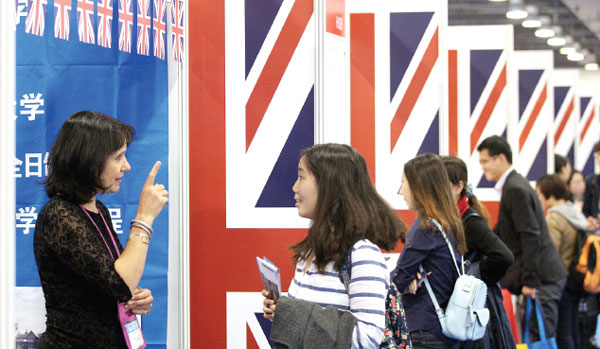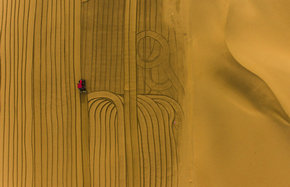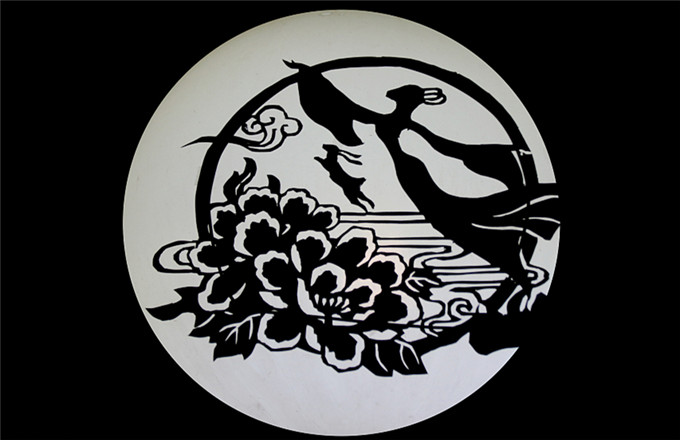Fusion of teaching methods bodes well
UK-led training initiative can point the way for further alliances involving European and Chinese mainland universities
As the Chinese economy continues its transition from low-cost producer to premium brand provider, few would underestimate the pivotal role being played by the Chinese university sector.
It is, therefore, incredibly encouraging to see major change taking place there, too. But few would also underestimate the important infusion of Western university teaching and learning practices.
It is therefore great to report on the groundbreaking training programs now being led by the UK's Higher Education Academy in Chinese mainland universities.
|
A Chinese student talks with a British teacher at an exhibition in Beijing. Opportunities for European institutions similar to the HEA to contribute to the development of professional teaching practices inside Chinese mainland universities are growing, with Chinese university teachers more open than ever to change. Wang Zhuangfei / China Daily |
In fact, only a matter of months ago, the HEA hosted a group of 31 academics from 10 universities and colleges, mainly from southern China. The four-day training program took place at Guangdong University of Foreign Studies and focused on innovative pedagogies and creative curriculum design.
This innovative and important initiative should act as a catalyst for continued change in university teaching approaches across the Chinese mainland, and it should also attract the attention of organizations across Europe similar to the UK-based HEA, as well as European universities.
Public feedback from the delegates who attended this program has recently been made available, and it makes for great reading. The HEA program has earned every right to be labeled as a genuine master class and, according to delegate feedback, has contributed to an immediate improvement in teaching delivery and the student learning experience.
It only came about due to a serendipitous meeting between Stephanie Marshall, the HEA's chief executive, and Zhong Weihe, former vice-president of Guangdong University of Foreign Studies. The pair met at last year's China Association for Higher Education conference.
Overall, in the feedback the delegates found the program to be extremely thought-provoking, commonly using phrases such as "hugely helpful" and "a great influence". But more specifically, delegates have reported that the program inspired them to change their teaching practices with immediate effect. The inclusion of "fun", with a moderate dosage of "humor", has also been cited as part of the program's impact.

The traditional Chinese method of teaching at all levels, from primary through tertiary, has been well documented and needs no further discussion here, but what is most exciting about the impact of this recent HEA program in China is the desire and commitment among Chinese university teachers to change to a far more participative, student-centered approach.
Far too many European universities and Europe-based HEA-like organizations still remain blissfully unaware of this change in attitude across the Chinese mainland university sector.
Modern, innovative and ambitious Chinese companies have captured considerable media attention with their successful international expansion and global brand building, such as Huawei and Dalian Wanda, and Chinese universities are now following a similar path.
Until recently, links between European and Chinese universities have followed a very similar, predictable path in which the European partner expands into China and European academics visit for short, intensive teaching visits.
But soon we will witness more Chinese universities establishing their own base in Europe, adding to the already exciting prospects for further collaborative Sino-European arrangements across the university sector.
European universities need to not only be aware of these changes that are sweeping across the Chinese mainland university sector, but should also seek a fusion of Western and Chinese university teaching methods. Taking the very simplistic view that Chinese universities and their teachers need to shift along some methodological continuum, from prescriptive to participative, could prove problematic - and certainly a sub-optimal alliance will result.
European HEA-like institutions need to recognize the strengths of the traditional Chinese university teaching approach.
Nowhere is this more true than the growth area of international business education. For example, mathematics and statistical data analyses continue to play a big part in many areas of business education at Chinese mainland universities, unlike at European universities. Chinese university teachers, therefore, have very valuable input, and the European university sector would benefit significantly if this wealth of scientific knowledge was somehow added to their business education curriculum. The inclusion of a range of suitable mathematics and statistics techniques for Europe-based business students, such as sales forecasting and consumer behavior modeling methods, would also beef up the intellectual rigor of business education programs.
Future business leaders who actually understand relevant scientific methods will be far better placed to make informed and logical international business decisions.
But at the same time, the European partner in any Sino-European university alliance should complement the scientific approach with the need for facilitating the development of intuition and qualitative judgement in strategic decision-making.
What adds substantially to the chances of success for any future Sino-European links and specific training programs is the possibility of a tangible, highly valued and internationally recognized teaching qualification and/or membership status.
The UK-based HEA Fellowship and Senior Fellowship awards provide a perfect example of a tangible and public reward that similar European institutions should seek to emulate. Chinese university teachers will be motivated even more with such a reward at the end of a series of training initiatives.
But even here, the HEA could revisit the criteria for awarding both Fellowship and Senior Fellowship and consider the inclusion of traditional Chinese university teaching methods. For example, much Chinese university teaching still takes place inside large lecture theaters with relatively large classes compared with teaching in Europe, and this demands excellent organization and overall classroom control, skills that many Europeans lack.
The HEA and similar European-based institutions should also see the positive side of the respect and overall culture of cordiality that permeates Chinese mainland university classrooms. While this atmosphere is in part due to traditional Chinese culture, it also results from Chinese university teacher skill and ability.
European-led, HEA-like teacher training initiatives inside Chinese mainland universities should, therefore, build on the strengths of the traditional Chinese approach with the typical European and Western approach where participation and critical thinking take center stage.
Chinese business and management methods will spread with the continued internationalization of more sectors of Chinese industry, another reason a simple replacement of traditional Chinese teaching methods should not be attempted.
A superior position should also not come across during any European-led teacher training programs inside Chinese mainland universities. Chinese university teachers appear to have responded so well to this very recent HEA-led training program, mainly because the training did not prescribe a different approach, but rather Chinese university teachers were encouraged to reflect on their existing methods. A spirit of mutual respect and empowerment appears to have been successfully implemented.
Opportunities for European institutions similar to the HEA to contribute to the development of professional teaching practices inside Chinese mainland universities are growing, with Chinese university teachers more open than ever to change. But effective training will only result if due respect and much attention is paid to traditional Chinese teaching methods as well as modern European and other Western approaches.
The author is a visiting professor at the University of International Business and Economics in Beijing and a senior lecturer at Southampton University. The views do not necessarily reflect those of China Daily.
(China Daily European Weekly 10/06/2017 page10)























